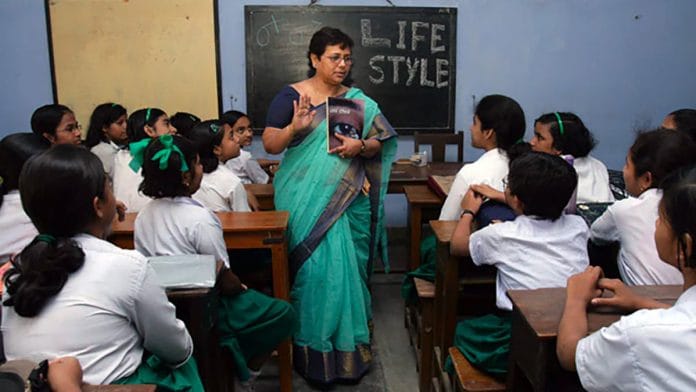New Delhi: Schools should not have sex education as a subject, or as any part of the curriculum, under India’s New Education Policy (NEP), RSS-backed education body Shiksha Sanskriti Utthan Nyas (SSUN) has suggested.
The draft NEP uses the word sex education, something which SSUN is against.
“Sex education will also be included in secondary school for future judgment surrounding consent, harassment, respect for women, safety, family planning and STD prevention,” the draft policy states.
The Ministry of Human Resource Development has made the draft NEP public after much consultation and sought suggestions from the public, based on which it will finalise the policy. HRD Minister Ramesh Pokhriyal ‘Nishank’ had said the ministry had received more than 1,50,000 suggestions from the public and various stakeholders.
Currently, under the Adolescence Education Programme (AEP), schools impart life skills as part of the overall curriculum, which is integrated across subjects and classes.
‘Why should it be taught in schools?’
SSUN secretary Atul Kothari told ThePrint the body had recommended that the phrase ‘sex education’ not be used.
“There is no need for that. Why should it be taught in schools?” said SSUN secretary Atul Kothari.
“Things that students should be aware of in terms of physical structure etc. are already being taught through subjects like biology. However, counselling on a need basis can be done for the students.”
Kothari further said that every child is an individual, and they all have different requirements, so sex education should not be made part of the curriculum.
The SSUN has also stressed on counselling for parents.
“There is a need for parents to be counselled. They need to be told how to handle certain situations. At the same time, issues that teenagers face — personal problems of students etc. — should definitely be taken up, but can’t be made mandatory for everyone,” he said.
Kothari said wherever sex education has been implemented, the results have not been good. “The committee on petitions, composed of Rajya Sabha MPs, had decided sex education should not be taught in schools. Jahan laagu hua uska parinaam aap jaante hain kya hua,” he said.
The organisation has also recommended a Vedic Shiksha/Bharatiya Shiksha board should be constituted, under which Sanskrit pathshalas and gurukuls can fall.
What is SSUN?
The SSUN was founded by RSS pracharak and educationist/historian Dinanath Batra. It has demanded that schools include tenets of India’s traditional knowledge system and focus on the Vedas, the philosophies of Swami Vivekananda, Srinivasa Ramanujan, A.P.J. Abdul Kalam and others.
In 2015, Batra had said there should be no sex education in schools and had pitched for Indian history, Vedic mathematics, Sanskrit, personality development, life values and physical training.
What is AEP?
Currently, the National Council of Educational Research and Training (NCERT) and the HRD ministry run the AEP, which was launched in 2005 “to empower young people with accurate, age-appropriate and culturally-relevant information, promote healthy attitudes and develop skills to enable them to respond to real-life situations in positive and responsible ways”.
According to a senior official, the NCERT coordinates the programme and works through both curricular and co-curricular formats, as per the National Curriculum Framework, 2005.
“To facilitate the nodal teachers to transact life skills based education in the classroom, NCERT, with support from UNFPA (United Nations Fund for Population Activities), has developed training and resource materials that recommend a minimum of 23 hours of transaction around the themes of understanding changes during adolescence and being comfortable with them, establishing and maintaining positive and responsible relationships, understanding and challenging stereotypes and discrimination related to gender and sexuality, recognising and reporting abuse and violation, prevention of substance misuse and HIV/AIDS,” the AEP website states.
“To create an enabling environment for the implementation of the AE programme, advocacy sessions are organised with principals of participating schools and sensitisation sessions are held with parents.”
Also read: Coming soon in Indian classrooms: Sex education 2.0
This report has been corrected to reflect that the HRD minister is Ramesh Pokhriyal ‘Nishank’. The error is regretted.







I support the argument. Whenever the exam paper is set by the examining body even it is upsc, psc, ugc, they say that if any mistakes seen in translation (Hindi) the english version is taken to be final. Most of the term translated to hindi or any othet languages is some times confusing the reader..The examining body giving importance to the English version of question paper even a mistakes in regional version of same question paper..So the argument is valid…
हिंदी को देश की प्रथम राजभाषा बनाओ